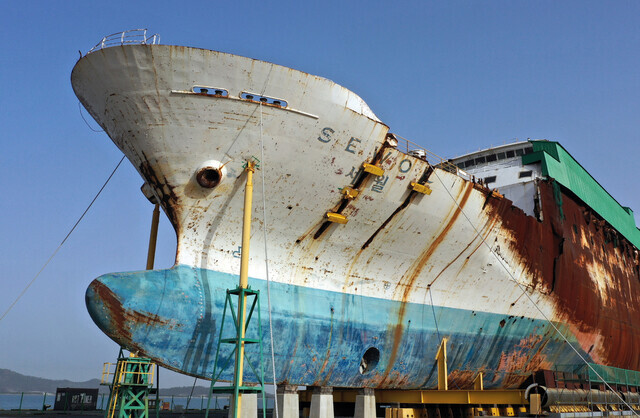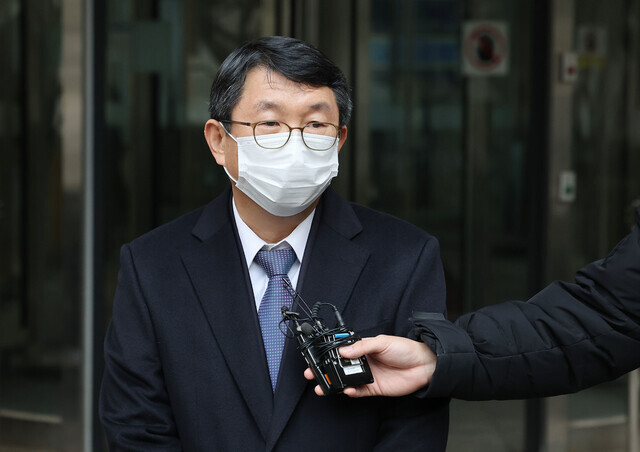hankyoreh
Links to other country sites 다른 나라 사이트 링크
Korea’s Supreme Court absolves state of responsibility in Sewol ferry disaster

Nine years after the tragic sinking of the Sewol ferry, the top brass at the Korean Coast Guard during the presidency of Park Geun-hye (including then Commissioner General Kim Suk-kyoon) were acquitted on charges of causing the deaths of ferry passengers through negligence in their duty to respond promptly to the accident. So far, the only member of the Coast Guard who has been held legally responsible for the botched rescue of the Sewol is a commander on the ground.
On Thursday, the second panel of the Supreme Court, under Justice Lee Dong-won, upheld a lower court’s acquittal of Kim Suk-kyoon, who had been charged with manslaughter resulting from negligence on the job.
All nine of the defendants — including Kim Soo-hyun, former west coast chief; Choi Sang-hwan, former deputy director; and Kim Mun-hong, former head of the Mokpo office — were also cleared of that charge, in line with the lower court’s ruling.
Kim Mun-hong and Lee Jae-du, former captain of Coast Guard cutter No. 3009, were convicted of falsifying documents while reporting the incident, landing them with respective prison sentences of one year and six months (suspended for three years) and six months (suspended for two years).
In February 2020, Kim Suk-kyoon and other defendants were charged with failing to fulfill precautionary duties needed for rescue operations during the Sewol ferry disaster on April 16, 2014, and causing the deaths of 303 and the injuries of 142. Courts found them not guilty in all three trials. This judgment was based on the fact that the captain and crew of the Sewol escaped the ferry without instructing passengers to disembark and reporting about the situation on deck, making it difficult for the Coast Guard command to predict mass casualties. The fact that the Sewol sank more quickly than expected due to excessive building extensions and illegal overloading — factors that could not have been foreseen — was also taken into consideration.

With this, the state virtually shirked off its responsibility for failing to rescue passengers — primarily high school students — on the Sewol. While 12 Coast Guard members have been indicted for the rescue failure so far, Kim Kyung-il, who served as the captain of Coast Guard Vessel 123 at the time of the tragedy, is the only person who has been found guilty, sentenced to three years in prison in 2015.
Other than Kim Kyung-il, who was an on-scene commander, it took six years to take other members of the Coast Guard involved to court. The investigation team that was established immediately after the disaster prosecuted only Kim Kyung-il, who was in charge of rescue operations on the scene, for professional negligence resulting in death even after probing the entire Coast Guard command. The Coast Guard command was handed over to trial only after a special investigation team of prosecutors set up in 2019 during the Moon Jae-in administration re-investigated the case.
Although the court regarded the Sewol ferry rescue failure as a matter of “reproach from a supervisory responsibility perspective” rather than one of criminal prosecution, these individuals were not even subject to government-level disciplinary action. While Kim Su-hyeon, the former head of the Coast Guard’s west coast division, was dismissed from his post to take responsibility for the Sewol ferry disaster, the rest of the Coast Guard command was let off scot-free.
Kim Suk-kyoon, who was a political appointee, avoided discipline and retired without trouble in November 2014, upon the dissolution of the Coast Guard and the launch of the Ministry of Public Safety and Security. Since last year, he has been serving as a professor of coast guard studies at Hanseo University and advising the law firm DR & AJU.
Although former deputy head of the Coast Guard Choi Sang-hwan was removed from his post following allegations that he provided preferential treatment to Undine Marine Industries, a private salvage company that led search and rescue efforts at the time, his suit requesting the revocation of his dismissal was approved, freeing him from liability.
Former Mokpo Coast Guard chief Kim Mun-hong was merely demoted despite the Board of Audit and Inspection’s demand for his dismissal. After a stint as head of planning and operations at the Ministry of Public Safety and Security’s Western Maritime Security and Safety Headquarters, he eventually became captain of Vessel 1513 at the Eastern Maritime Security and Safety Headquarters.
Lee Chun-jae, who was formerly the head of the Coast Guard’s Security and Safety Bureau, went on to serve as the chief of the Southern Maritime Security and Safety Headquarters in 2015 and eventually as the Coast Guard safety coordinator.
Bereaved families could not hide their disappointment regarding the judging. Kim Jong-ki, the April 16 Sewol Families for Truth and a Safer Society’s head of operation, remarked that “what [he] suspected became reality,” adding, “confronted by a reality in which even the Supreme Court puts out an unacceptable ruling that defies common sense, the public is of heavy heart, grief-stricken, and extremely angered, unable to know who to trust.”
“I can only take this to mean that the state will not take responsibility even if disasters and tragedies happen in this country,” said Jeong Seong-wook, the group’s chief of truth ascertainment. “The state will pass all responsibility to individuals not just regarding the Sewol ferry disaster but also the Itaewon disaster and the Osong disaster.”
By Lee Ji-hye, staff reporter; Lee Jae-ho, staff reporter; Kim Hye-yun, staff reporter
Please direct questions or comments to [english@hani.co.kr]

Editorial・opinion
![[Editorial] Silence won’t save Yoon [Editorial] Silence won’t save Yoon](https://flexible.img.hani.co.kr/flexible/normal/500/300/imgdb/original/2024/0701/681719819632087.jpg) [Editorial] Silence won’t save Yoon
[Editorial] Silence won’t save Yoon![[Column] The miscalculations that started the Korean War mustn’t be repeated [Column] The miscalculations that started the Korean War mustn’t be repeated](https://flexible.img.hani.co.kr/flexible/normal/500/300/imgdb/original/2024/0630/9717197068967684.jpg) [Column] The miscalculations that started the Korean War mustn’t be repeated
[Column] The miscalculations that started the Korean War mustn’t be repeated- [Correspondent’s column] China-Europe relations tested once more by EV war
- [Correspondent’s column] Who really created the new ‘axis of evil’?
- [Editorial] Exploiting foreign domestic workers won’t solve Korea’s birth rate problem
- [Column] Kim and Putin’s new world order
- [Editorial] Workplace hazards can be prevented — why weren’t they this time?
- [Editorial] Seoul failed to use diplomacy with Moscow — now it’s resorting to threats
- [Column] Balloons, drones, wiretapping… Yongsan’s got it all!
- [Editorial] It’s time for us all to rethink our approach to North Korea
Most viewed articles
- 1Japan is building a military meant for more than self-defense — and has the US to thank for it
- 2Yoon’s prosecutors are throwing everything at the president’s opponents to see what’ll stick
- 3[Editorial] Silence won’t save Yoon
- 4NewJeans rocks Tokyo Dome as new, younger generation of K-pop fans emerges in Japan
- 5[Column] The miscalculations that started the Korean War mustn’t be repeated
- 6Dreams of a better life brought them to Korea — then a tragic fire tore them apart
- 7[Editorial] Exploiting foreign domestic workers won’t solve Korea’s birth rate problem
- 8Moscow tells Seoul to rethink ‘confrontational course’
- 9How million-strong candlelight demonstrations are being organized
- 10“You are not alone”: Sister of Sewol ferry tragedy victim’s letter to Itaewon survivors